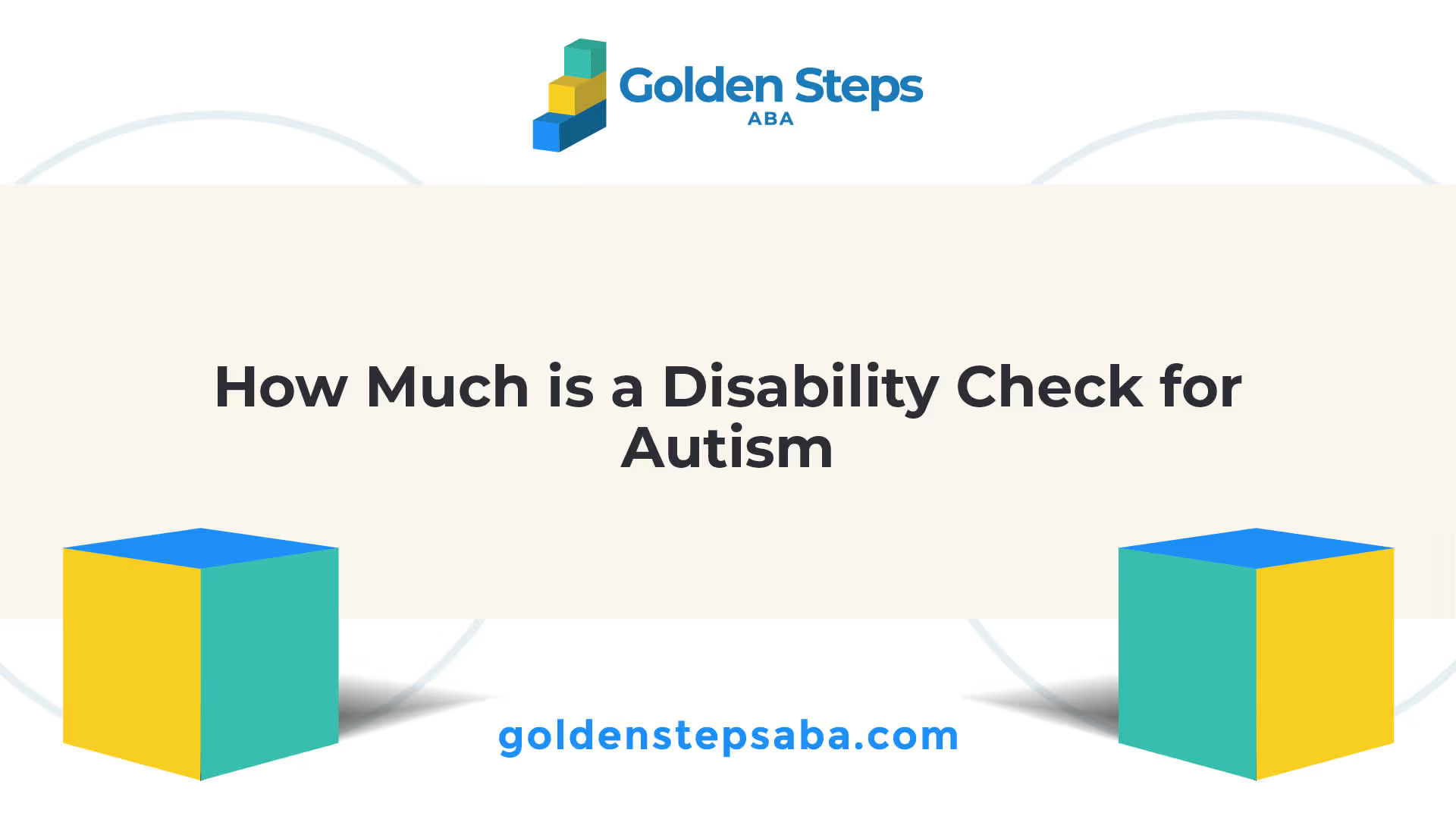Understanding Disability Checks for Autism
Navigating the world of disability benefits can be complex, particularly when it comes to understanding the specific benefits available for individuals with autism. This article aims to provide a comprehensive look at disability checks for autism and establishes the basis for who is eligible to receive these benefits.
Definition of Disability Checks
Disability checks, often referred to as disability benefits, represent the financial assistance provided by the government to individuals who have a disability that limits their ability to work or perform daily activities. These benefits are designed to provide financial support to compensate for the individuals' inability to earn income due to their disability. For individuals with autism, these checks can help cover the costs associated with treatments, therapies, and everyday living expenses.

Eligibility for Disability Checks
Eligibility for disability checks varies by country and specific program, but generally, it is determined based on the severity of the individual's symptoms, the impact of autism on their ability to work, their income, and other factors.
In Canada, for example, to be eligible for the Disability Tax Credit (DTC), the individual must have a severe and prolonged impairment in mental functions that markedly restricts the individual's ability to perform a basic activity of daily living, which can include things like speaking, hearing, walking, feeding, and dressing.
In the United States, the Social Security Administration offers disability benefits for those with autism through the Supplemental Security Income (SSI) program, which provides a monthly stipend to people with disabilities who meet certain income and asset requirements.
Understanding the eligibility requirements for disability checks is crucial for families seeking financial assistance for autism care. It's often advisable to seek professional assistance when applying for these benefits to ensure all requirements are met and to maximize the financial support available.
These benefits can greatly help families meet the financial demands associated with autism care. In the following sections, we will delve deeper into the specific disability benefits available for autism in Canada, the United States, and Ontario.
Disability Benefits in Canada
In Canada, there are specific benefits available for individuals with autism. These include the Disability Tax Credit (DTC) and the Canadian Child Disability Benefit (CDB).
Disability Tax Credit (DTC) for Autism
The Disability Tax Credit is a non-refundable tax credit that helps persons with disabilities, or their supporting persons, reduce the amount of income tax they may have to pay. For individuals with autism, the amount of DTC benefits can vary greatly. According to Resolute Legal, the DTC can be worth up to $8,576 in 2021.
Eligibility for the DTC is determined by the severity and duration of the individual's impairment in mental functions. The impairment must markedly restrict the individual's ability to perform a basic activity of daily living, which can include things like speaking, hearing, walking, feeding, and dressing.
In cases where the individual with autism does not have enough income to benefit from the tax credit, the DTC benefits can be transferred to a supporting person.
Canadian Child Disability Benefit (CDB)
The Canadian Child Disability Benefit is additional financial support provided to families caring for a child under the age of 18 who is eligible for the DTC. For 2021, the maximum annual benefit for CDB is $2,886.
The CDB is a tax-free benefit, and it is calculated based on the family's adjusted net income and the number of qualified children in the family. The benefit is paid monthly, and it is designed to help families with the additional costs of caring for a child with a disability.
Families should consider working with professionals who have experience in assisting with the disability application process to ensure they receive the maximum financial support available for their situation.
The aforementioned figures provide a basic understanding of the monetary assistance available for individuals with autism in Canada. However, the actual amount of disability checks can vary based on individual circumstances. The exact amount will depend on factors such as family income, the severity of the disability, and additional provincial or territorial benefits.
Disability Benefits in the United States
In the United States, two primary disability benefit programs exist for individuals with autism: Social Security Disability Insurance (SSDI) and Supplemental Security Income (SSI). These programs are administered by the Social Security Administration (SSA) and are designed to provide financial support to individuals who are unable to work due to a disability.
Social Security Disability Insurance (SSDI)
SSDI is available to individuals who have earned enough work credits and are unable to work for at least 12 months. The eligibility criteria for individuals with autism to qualify for SSDI benefits include meeting specific criteria set by the SSA and demonstrating an inability to perform work suitable for their level of education or for which they could reasonably be trained.
The exact amount of SSDI benefits received depends on individual circumstances, including work history, earnings, and other factors. The average monthly disability benefit received by a disabled worker through SSDI is $1,275, with some recipients receiving over $3,000 monthly based on their work history.
Supplemental Security Income (SSI)
SSI provides a monthly stipend to individuals with disabilities who meet certain income and asset requirements. Eligibility for SSI benefits for autism is determined based on a variety of factors including the severity of the individual's symptoms, the impact of autism on their ability to work, their income, and more.
In 2022, the monthly maximum Federal SSI payment for an individual was around $841, while the average payment was approximately $603 per month for an individual, with some states offering supplemental payments to increase this amount [2].
Meeting the eligibility criteria for SSI or SSDI does not guarantee approval for disability benefits, as the application process involves detailed documentation and evaluation by the SSA.
The SSA considers various factors like income, resources, living arrangements, and marital status when determining the amount of disability benefits for autism. These calculations can be complex and vary on a case-by-case basis.
Disability Benefits in Ontario
In Ontario, there are specific programs in place to support individuals with autism. These programs not only provide financial assistance but also include additional benefits to ensure comprehensive support for autistic individuals and their families.
Ontario Disability Support Program (ODSP)
Adults with autism, who are unable to support themselves financially due to their disability, may be eligible for the Ontario Disability Support Program (ODSP). This program provides financial assistance for basic needs such as food and shelter. The amount received from ODSP varies depending on factors such as living situation, marital status, and other sources of income, but it is intended to cover basic necessities [5].
Specifically, the ODSP is designed to ensure individuals with autism have the necessary support to meet their basic needs if they are unable to work due to their disability.
However, the exact amount of financial assistance received through the ODSP for individuals with autism will depend on various factors. Individuals are encouraged to contact the program directly for more detailed information on eligibility and benefit amounts.
Additional Benefits from ODSP
Apart from monetary assistance for basic necessities, the Ontario Disability Support Program (ODSP) also offers additional benefits. These include coverage for essential health-related items not covered by other services, dental and eye care benefits, and more.
These additional benefits aim to provide a holistic support system for autistic individuals, addressing not just financial needs but also their overall well-being.
In conclusion, Ontario provides substantial support for individuals with autism through the ODSP and its additional benefits. However, it is advisable to contact the program directly or seek professional assistance for a thorough understanding of the benefits and eligibility criteria.
Applying for Disability Benefits
Applying for disability benefits can be an overwhelming process, especially for families managing the challenges of autism. Understanding the process and seeking professional assistance can ensure the maximum financial support available is received.
Application Process for Disability Benefits
The application process for disability benefits varies depending on the country and the specific program. In general, it requires an assessment of the individual’s needs to determine the services required to meet those needs [6].
In the United States, the two primary disability benefit programs available for individuals with autism are Social Security Disability Insurance (SSDI) and Supplemental Security Income (SSI). The Social Security Administration (SSA) recognizes Autism Spectrum Disorders (ASD) as eligible for disability benefits for both children and adults. Eligibility is based on demonstrating an inability to perform work suitable for their level of education or for which they could reasonably be trained [3].
In Ontario, adults with autism who are unable to support themselves financially due to their disability may be eligible for the Ontario Disability Support Program (ODSP), which provides financial assistance for basic needs such as food and shelter.
Seeking Professional Assistance for Applications
Applying for disability benefits can be complex and time-consuming. To ensure the maximum financial support available for their situation, families should consider working with professionals who have experience in assisting families with the disability application process [1].
Professionals can help navigate the application process, ensure all necessary documentation is provided, and advocate on behalf of the family. They can also assist in exploring various grants, services, and financial assistance programs offered by government agencies, non-profit organizations, and local communities to support individuals with autism and their families.
The application process for disability benefits can be challenging, but with the right information and support, families can navigate it successfully. Ultimately, the goal is to secure the necessary financial support to provide the best possible care and support for individuals with autism.
Factors Influencing Disability Check Amounts
Understanding the factors influencing disability check amounts can be critical for individuals and families affected by autism. These factors vary, but primarily focus on income, resources, living arrangements, and marital status. Understanding these factors can help in predicting potential disability check amounts.
Determining Factors for Autistic Individuals
The Social Security Administration (SSA) considers various factors when determining the amount of disability benefits for autism. These calculations can be complex and vary on a case-by-case basis. Among the factors considered by the SSA are income, resources, living arrangements, and marital status.
Moreover, the Social Security Administration (SSA) recognizes Autism Spectrum Disorders (ASD) as eligible for disability benefits for both children and adults. Eligibility is based on demonstrating an inability to perform work suitable for their level of education or for which they could reasonably be trained.
Average Disability Check Amounts
When exploring "how much is a disability check for autism", it's important to note that the average government disability check for autism is $1,234 per month, but the amount can vary depending on the state and individual circumstances.
In the context of the United States, the Social Security Administration offers disability benefits for those with autism through the Supplemental Security Income (SSI) program. In 2022, the monthly maximum Federal SSI payment for an individual was around $841, while the average payment was approximately $603 per month for an individual, with some states offering supplemental payments to increase this amount [2].
Using these figures as a guide can help individuals and families understand what they might expect in terms of financial support. However, it's important to note that these are average figures and the actual amount may vary based on individual circumstances and eligibility.
References
[1]: https://www.resolutelegal.ca/autism-disability-benefits-canada/
[2]: https://www.autismspeaks.org/autism-grants-families
[3]: https://www.bridgecareaba.com/blog/how-much-is-a-disability-check-for-autism
[4]: https://www.apexaba.com/blog/how-much-is-a-disability-check-for-autism
[5]: https://www.respiteservices.com/app/media/5152
[6]: https://www.quebec.ca/en/health/health-system-and-services/assistive-devices-disabilities-and-handicaps/services-for-persons-with-a-disability

